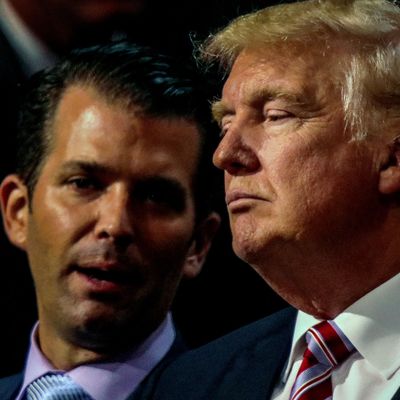
One of the most intriguing unsolved mysteries of the Russia investigation has been a series of phone calls Donald Trump Jr. made to a blocked phone number while he was setting up a meeting during the campaign with Russian agents who were promising to help his father. Many people, including me, speculated that the call might have been to his father to inform him of the meeting. Yesterday, CNN reported the calls were actually “between Trump Jr. and two of his business associates.”
Trump and his supporters, presented with one of the very few times a suspicious angle in the Russia investigation did not pan out, immediately began gloating:
To be clear, nobody said the phone calls “were made to his father.” They said the calls might have gone to his father. (Democrat Eric Swalwell suggested last year, “That looks like he may very well have been trying to call his father to talk to his father about taking this meeting.”) They didn’t. So, whether or not Trump Jr. did inform his father of the meeting — Steve Bannon speculated he did so in person immediately after — he didn’t do it through those phone calls.
On the other hand, the notion that Donald Jr. was just making an innocent phone call to what some reports have described as a “longtime family friend” elides some distinctly less innocent possibilities opened by this news.
The recipient of one of the phone calls was Howard Lorber who is, yes, a “family friend.” But he is also a longtime point of contact in Trump’s ambitions to build a tower in Moscow, which date back to the 1980s. Lorber accompanied Trump on a 1996 visit to Moscow to explore building there. “Howard has major investments in Russia,” Trump boasted to a Russian politician at the time. As Craig Unger notes, Lorber’s dealings in Russia put him in contact with Russian mobsters.
Trump Jr. was also very active in the family efforts to consummate the Moscow deal. Now, the timing of his call to Lorber may well be a total coincidence. But the more information that emerges about the Moscow tower project, the more central it appears to be to the Trump-Russia relationship. Coincidentally, in an interview yesterday, the New York Times asked Trump about his Moscow building plans. He dismissed the episode as a minor discussion that went nowhere:
I had no money invested. It was a letter of intent, or option. It was a free option. It was a nothing. And I wasn’t doing anything. I don’t consider that even business. And frankly, that wasn’t even on my radar. If you take a look at that, take a look at the deal. There was no money put up. There was no transfer. I don’t think they had a location. I’m not even sure if they had a location. …
I had very little interest in the first place, and again, I viewed it as a free option. It may have been a letter of intent. I don’t know exactly what it was called. But it was unimportant.
There was a letter of intent, which BuzzFeed News obtained. Trump signed it. And there also was a location selected for the project, along with pages and pages of minute details, including a payment agreement that appeared highly lucrative for Trump — a $4 million fee up-front, plus a percentage of all condominium sales, rent, food and beverage fees, and fees for use of the spa and conference facilities.
You can’t read too much into Trump’s misstatements on this issue, because he lies about things all the time. But the relevant background here is not only the lies but also the pattern of Russian foreign influence operations. Russia tends to dangle business deals in front of its prospective foreign political partners. Those deals tend to intermingle organized crime and the state itself, which in Russia, operate in tandem.
Trump spent decades chasing a building deal in Moscow. Russia was dangling that opportunity in front of him throughout the campaign, at a time it was dealing with him secretly, and also promising to help his campaign. Not every suspicious detail in this episode will turn out to indicate guilt, but the prospect that this story ends innocently for Trump is slim, and growing slimmer.






























